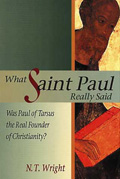
N. T. Wright
Reviewed by: Sidney D. Dyer
What Saint Paul Really Said: Was Paul of Tarsus the Founder of Christianity? by N. T. Wright. Published by Eerdmans, 1997. Paperback, 192 pages, list price $16.00. Reviewed by Prof. Sidney D. Dyer of Greenville Seminary.
N. T. Wright desires to unite Roman Catholics and evangelicals, and this is evident in this book where he takes the doctrine of justification out of the realm of soteriology and places it within ecclesiology. This enables him to claim that "the doctrine of justification is in fact the great ecumenical doctrine" (p. 158).
According to Wright, the issue in Galatia was not how men are declared righteous by God, but "how you define the people of God: are they to be defined by the badges of Jewish race, or some other way?" (p. 120). He explains that justification "is not 'how you become a Christian', so much as 'how you can tell who is a member of the covenant family' " (p. 122). Thus, according to him, "justification, in Galatians, is the doctrine which insists that all who share faith in Christ belong at the same table, no matter what their racial differences" (p. 122). This statement conveys what Wright regards the doctrine to be, not what it implies.
In Philippians 3:9, Paul declares that he does not have his "own righteousness, which is from the law," and Wright explains that what Paul "is refusing in the first half of verse 9 is not a moralistic or self-help righteousness, but the status of orthodox Jewish covenant membership" (p.124).
Wright properly recognizes the forensic nature of justification, but he misapplies it. He sees God as the judge, before whom his people plead their case against the wicked pagans. He regards future justification to be God's vindication of his people against their enemies, and identifies this vindication as "the status of 'righteousness' "(p. 99) that is gained by believers "when the court finds in their favour" (p. 98).
Paul, contrary to Wright, in Acts 13:38-39 connects justification with the forgiveness of sins and, therefore, regards justification as the transaction whereby God forgives sins through his Son. All men will also stand before God at the final judgment, but believers and unbelievers will not be disputing parties.
Wright will have nothing to do with a view of justification that puts Roman Catholics and Protestants at odds with each other. He writes:
The doctrine of justification, in other words, is not merely a doctrine which Catholic and Protestant might just be able to agree on, as a result of hard ecumenical endeavour. It is itself the ecumenical doctrine, the doctrine that rebukes all our petty and often culture-bound church groupings, and which declares that all who believe in Jesus belong together in the one family (p. 158)
This statement demonstrates that Wright interprets Paul with an ecumenical agenda. He has sought to shift the focus away from soteriology to ecclesiology in an attempt to encourage unity between Roman Catholics and Protestants.
Wright's view of justification is an attack on the very heart of the gospel, and his view must be thwarted. We must resist every attempt to reverse the Reformation. The issue is one of life and death, eternal life and eternal death. Theologians and pastors who deny the biblical and confessional doctrine of justification imperil the souls of men.
March 30, 2025
On the Trail with a Missionary
March 23, 2025
Midnight Mercies: Walking with God Through Depression in Motherhood
March 16, 2025
March 09, 2025
Zwingli the Pastor: A Life in Conflict
March 02, 2025
February 23, 2025
African Heroes: Discovering Our Christian Heritage
February 16, 2025
© 2025 The Orthodox Presbyterian Church